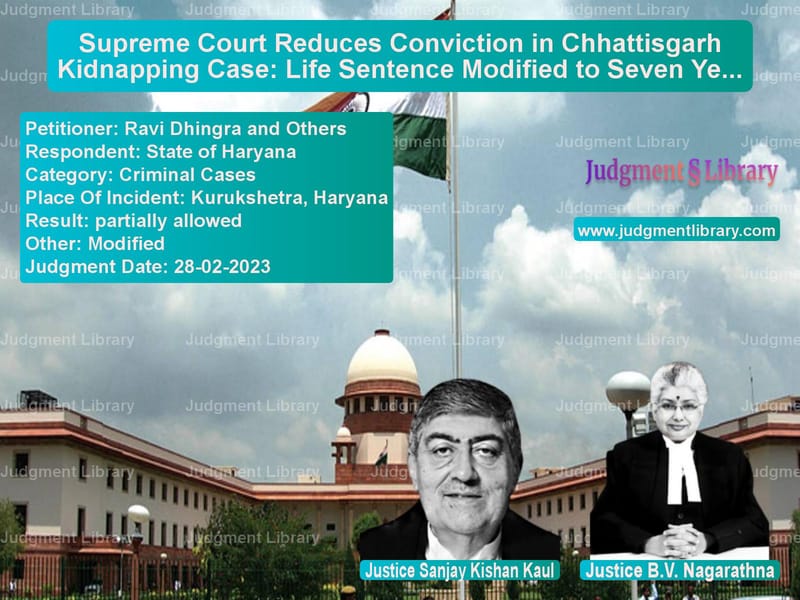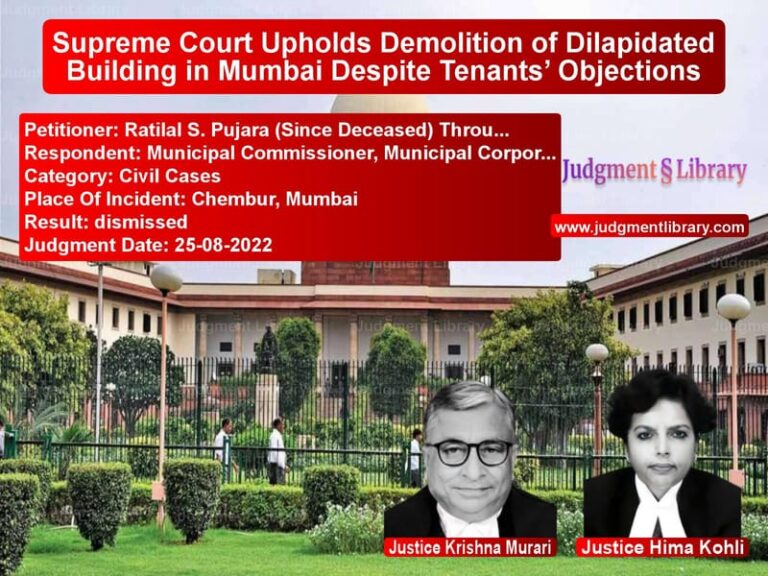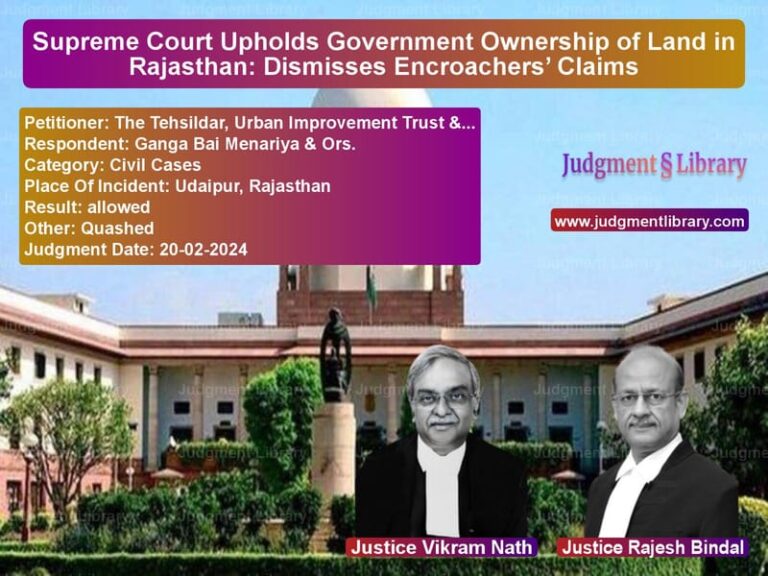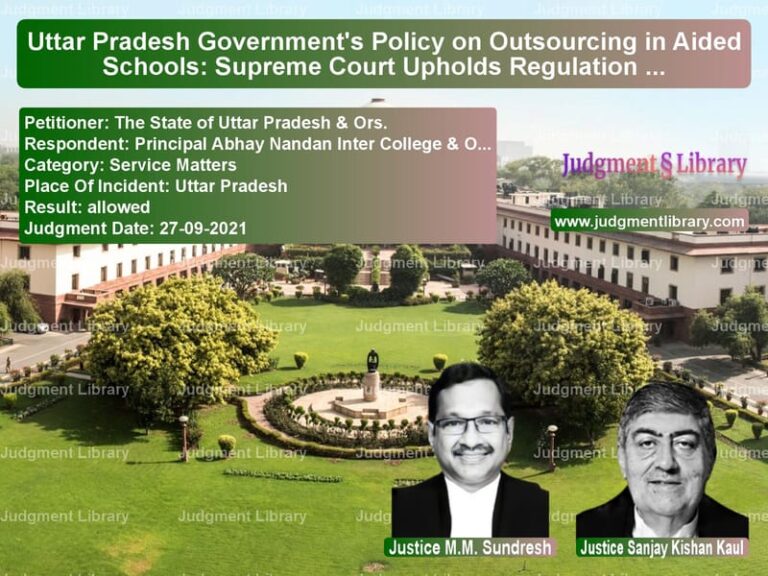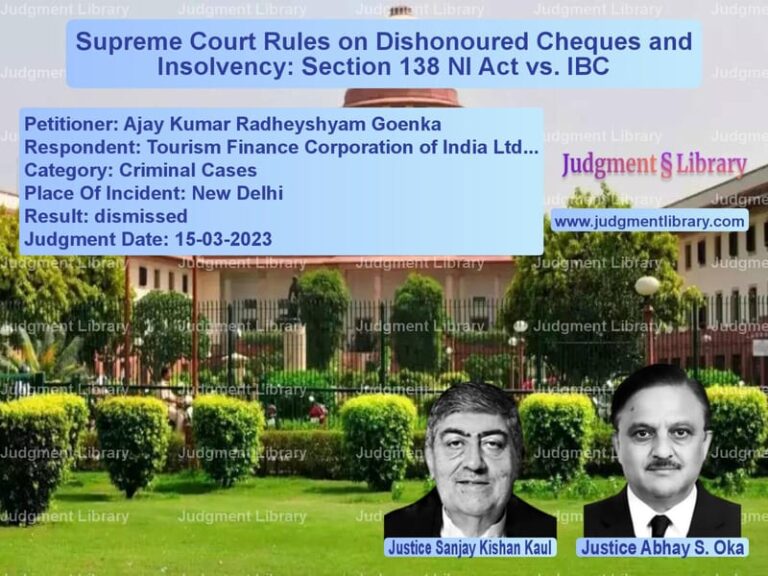Supreme Court Reduces Conviction in Chhattisgarh Kidnapping Case: Life Sentence Modified to Seven Years
The Supreme Court of India has modified the conviction of several accused in a high-profile kidnapping for ransom case in Chhattisgarh, reducing their sentence from life imprisonment under Section 364A of the Indian Penal Code (IPC) to seven years under Section 363 IPC. The ruling in Ravi Dhingra & Others vs. State of Haryana came after the Court found that the essential ingredients for the graver offence of kidnapping for ransom were not sufficiently established beyond a reasonable doubt.
Background of the Case
The case involved the abduction of 14-year-old Harsh Sobti in Kurukshetra, Haryana, on February 15, 2000. According to the prosecution, the accused forcibly took the victim in a vehicle, threatened him with a weapon, and later demanded a ransom of ₹15 lakh from his father, Dr. H.K. Sobti (PW-20). The victim was eventually released in the early hours of February 16, 2000.
Following an extensive investigation, the police arrested multiple accused, including Ravi Dhingra, Baljit Pahwa, Parvez Khan, and others. They were charged under Sections 148 (rioting), 149 (unlawful assembly), 364A (kidnapping for ransom), and 342 (wrongful confinement) of the IPC.
The trial court convicted all accused and sentenced them to life imprisonment under Section 364A IPC. The Punjab and Haryana High Court upheld the conviction, leading to an appeal before the Supreme Court.
Arguments by the Appellants (Accused)
- The appellants argued that the prosecution failed to establish the essential elements of Section 364A IPC, particularly the presence of an imminent threat to the victim’s life.
- They contended that the trial court and High Court erred in relying solely on the victim’s testimony without corroborating evidence.
- The appellants emphasized inconsistencies in the victim’s statements made to the police and during trial.
- They pointed out that their prolonged incarceration (over seven years) warranted a lesser sentence.
Arguments by the Respondents (State of Haryana)
- The prosecution maintained that the victim’s testimony was credible and consistent, confirming that the accused had threatened him and his family to secure a ransom payment.
- The prosecution argued that the kidnapping was premeditated, and the accused acted with the clear intention of extracting money.
- The respondents contended that there was no reason to disbelieve the victim, and his statements were supported by call records and witness testimonies.
Supreme Court’s Observations and Ruling
The Supreme Court closely examined the evidence and pointed out several key discrepancies:
- The victim’s initial statement to the police did not mention a direct threat to kill him, whereas his later testimony introduced new details.
- The requirement under Section 364A IPC, that the victim must be threatened with death or bodily harm to compel compliance with the ransom demand, was not sufficiently established.
- The evidence suggested that while the accused may have been involved in the kidnapping, the prosecution failed to prove the additional elements necessary for conviction under Section 364A IPC.
The Court held:
“The essential ingredients to convict an accused under Section 364A require clear proof of threat to the victim’s life or bodily harm, along with a demand for ransom. If these conditions are not met, a conviction under Section 364A is not sustainable.”
Final Judgment
The Supreme Court modified the conviction and issued the following directives:
- The conviction under Section 364A IPC was set aside and replaced with a conviction under Section 363 IPC (simple kidnapping).
- The sentence was reduced to seven years of imprisonment.
- If the appellants had already served more than seven years in prison, they were to be released immediately.
- The Court directed that the state should ensure no further undue incarceration of the accused.
Legal Precedents Cited
- SK Ahmed vs. State of Telangana (2021) – Held that all elements of Section 364A must be strictly proven for a conviction.
- Vikram Singh vs. Union of India (2015) – Explained the distinction between different categories of kidnapping offences.
- Malleshi vs. State of Karnataka (2004) – Ruled that mere demand for ransom is insufficient to sustain a conviction under Section 364A IPC.
Implications of the Judgment
This ruling carries several important implications for criminal jurisprudence:
- Higher Burden of Proof: The judgment reinforces that courts must meticulously assess whether the ingredients of a serious offence like Section 364A IPC are satisfied before convicting an accused.
- Protection Against Wrongful Convictions: Ensures that individuals are not wrongly sentenced to life imprisonment under stringent laws without sufficient evidence.
- Clear Legal Precedent: Provides a framework for future cases involving kidnapping and ransom demands, ensuring fairness in sentencing.
- Judicial Oversight: Establishes the Supreme Court’s role in correcting misapplications of criminal statutes at lower court levels.
Conclusion
The Supreme Court’s ruling in Ravi Dhingra & Others vs. State of Haryana marks a significant development in the interpretation of Section 364A IPC. By modifying the conviction and reducing the sentence, the Court has reinforced the principle that criminal liability must be established beyond a reasonable doubt, particularly in cases involving severe punishments. This judgment sets a crucial precedent in ensuring that stringent laws are not misapplied, thereby upholding the principles of fairness and justice in the Indian legal system.
Petitioner Name: Ravi Dhingra and Others.Respondent Name: State of Haryana.Judgment By: Justice Sanjay Kishan Kaul, Justice B.V. Nagarathna.Place Of Incident: Kurukshetra, Haryana.Judgment Date: 28-02-2023.
Don’t miss out on the full details! Download the complete judgment in PDF format below and gain valuable insights instantly!
Download Judgment: ravi-dhingra-and-oth-vs-state-of-haryana-supreme-court-of-india-judgment-dated-28-02-2023.pdf
Directly Download Judgment: Directly download this Judgment
See all petitions in Bail and Anticipatory Bail
See all petitions in Fraud and Forgery
See all petitions in Judgment by Sanjay Kishan Kaul
See all petitions in Judgment by B.V. Nagarathna
See all petitions in partially allowed
See all petitions in Modified
See all petitions in supreme court of India judgments February 2023
See all petitions in 2023 judgments
See all posts in Criminal Cases Category
See all allowed petitions in Criminal Cases Category
See all Dismissed petitions in Criminal Cases Category
See all partially allowed petitions in Criminal Cases Category

